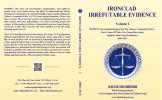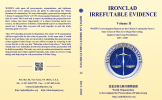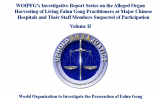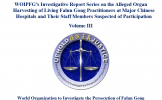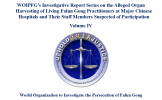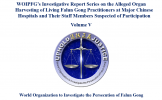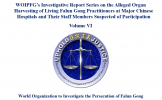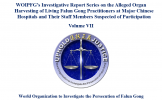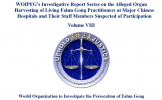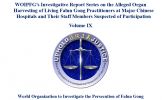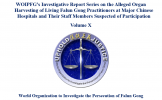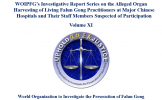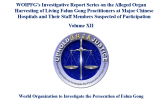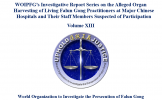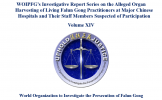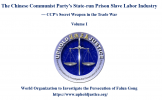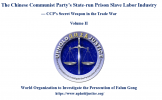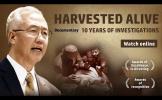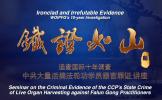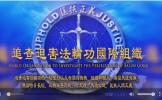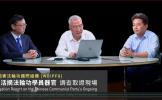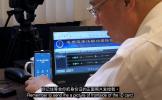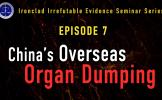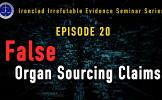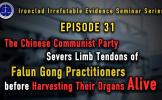Toronto Globe and Mail (front page article): CSIS warned Ottawa of Beijing media plot
Andrew Mitrovica
Jeff Sallot
Federal counterintelligence officers say they uncovered a well-financed Chinese government plot to muzzle criticism of Beijing's human-rights record in Canada's Chinese-language news media in the aftermath of the 1989 Tiananmen Square massacre.
The plot, involving proxy investors trying to buy control of Chinese-language media outlets, appears to have had little success, judging by the independent coverage in most of those
Nevertheless, the officers said wiretaps and informants revealed a detailed and worrisome picture of a foreign power trying secretly to manipulate political debate among Canadians of Chinese heritage.
Moreover, the officers said their top-secret report was ridiculed and buried by other branches of the federal government in 1994, the year Prime Minister Jean Chretien launched a major campaign to improve economic relations with Beijing.
Gordon Smith, the deputy minister of foreign affairs at the time, recalls the Canadian Security Intelligence Service report. "I took it seriously and found it plausible." But China was not the only country doing such things, he said.
CSIS's concerns about Beijing's attempts to control Chinese-language media are well-founded, according to several prominent members of the Canadian Chinese community.
Michael To, the Canadian representative of the World Council of Chinese Pro-democracy Organizations, points to the case of two senior journalists at a Chinese community newspaper in Ottawa who were forced to resign after the Chinese embassy complained about articles that criticized Beijing's human-rights record.
CSIS is required by law to investigate clandestine attempts by foreign powers to influence events in Canada. CSIS officers felt the secret activities of the Chinese government to control coverage in Chinese-language newspapers and broadcast outlets were clearly within the agency's mandate.
The top-secret 1994 report was the product of years of work by CSIS's China desk and involved a small team of officers in Ottawa and several other cities. CSIS gathered information from human sources, examined bank records and conducted wiretaps. The officers were satisfied they had proof that Beijing used myriad surrogate companies and wealthy Chinese expatriates to try to engineer control of the media operations, the counterintelligence sources said.
The report included "irrefutable evidence, including banking records that they [Beijing's agents] were heavily involved in buying up [Chinese-language] media in Canada," one veteran of the investigation said.
The investigation was so sensitive that the lives of the agency's informants were often at risk during the lengthy probe, sources said.
The Chinese government was not interested in converting the media outlets into overt tools of propaganda for the Communist regime, sources said. Rather, Beijing wanted to prevent Chinese-language media in Canada, which reach hundreds of thousands of Chinese-Canadians, from criticizing the regime, particularly after the Tiananmen Square massacre.
One counterintelligence officer said Beijing often employs proxies to secure control of Chinese-language media in foreign countries. Agents working on behalf the Chinese government would approach wealthy Chinese businessmen, who were sympathetic to the regime, to buy media outlets, a veteran CSIS officer explained.
Indeed, in 1993, there were reports that Chinavision, a now-defunct cable television station in Toronto devoted to Chinese-language programming, had links to Beijing. Financial records revealed that Chinavision received at least $300,000 for the purchase of equipment from companies based in China.
At the time, one former senior executive alleged that the television station toed the Communist line and received advice from Beijing's propaganda department.
One counterintelligence source said CSIS made a "representation" to the Canadian Radio-Television and Telecommunications Commission about Chinavision's alleged links to Beijing. However, a spokesman for the broadcasting regulator said the station's executives could not recall if CSIS had briefed them.
Chinavision's competitors did make the CRTC aware of allegations of "shady financial dealings" involving the popular Chinese-language television station, CRCT spokesman Denis Carmel said.
Joe Chan, general manager of Fairchild Media Group, which operates four Chinese-language radio stations and one television station that reach a combined audience of about 300,000 Canadians weekly, said the company bought Chinavision after it went into receivership in 1993. Mr. Chen said he heard "industry rumours" that Chinavision may have received money from firms linked to Beijing in the early 1990s. "We heard about that ... when Fairchild was trying to take over Chinavision at the time."
However, Mr. Chan said he could find no evidence to support the allegations. "It's difficult to find proof. We are prudent businessmen. We don't really care what they have done in the past," he said.
A CSIS veteran said the agency's investigation showed Beijing's embassy in Ottawa tried to exert control over small community-based Chinese-language newspapers by rewarding those considered "friendly" to the regime with advertising for future cultural-exchange events and by pulling ads from papers that ran stories critical of China's human-rights policy.
Both the publisher and assistant publisher of the Chinese Canadian Community News, a biweekly with a circulation of about 6,000 in Ottawa, were forced from their positions by the directors of the Chinese Community Association of Ottawa in October of 1998.
Anton Cheng, who was the association's chairman at the time, said the dispute involved the paper's finances. But the minutes of a board meeting during which the publisher and assistant publisher were fired -- and the recollection of others who were at the meeting -- indicate that finances had nothing to do with the ousters.
The minutes show that the Chinese embassy had complained to the association about the many articles in the paper that had been critical of Beijing's policies.
Mr. To of the World Council of Chinese Pro-democracy Organizations said the firings of the journalists are clear examples of Beijing's attempt to interfere with political events in Canada.
But the federal government is afraid to call Beijing on it because Ottawa is trying to promote trade with Beijing, Mr. To said.
Sean Rowan, a spokesman with the Department of Foreign Affairs and International Trade, said Canada does indeed promote dialogue with China on human rights and believes conditions for Chinese citizens are improving as China's economy grows.
Bob Ip, a city editor with Canada's largest Chinese-language newspaper Sing Tao, said if Beijing is involved in attempting to influence new coverage, then it is simply mirroring the actions of Western governments." It [the Chinese government] is just doing what other governments do. They always try to make use of the news media to promote themselves."
Alvin Liu, publisher of the World Journal, a Chinese-language daily with a circulation of 60,000 in Canada, said his paper has not been approached by Beijing directly or indirectly to tailor its news coverage. But smaller weekly newspapers often enjoy very chose relations with Chinese diplomats in Canada, he said. "When it involves Chinese matters, they will seek consultations, even instructions, from the Chinese consulate."
Mr. To said CSIS was more active in monitoring the activities of Chinese diplomats in Canada in the years after the 1989 massacre than it was after the Liberals came to office in 1993.
CSIS spokesman Dan Lambert said the agency is in a better position than Mr. To to judge what constitutes a national security threat and whether CSIS is doing its job properly. But if Mr. To has a complaint, he should go to the Security Intelligence Review Committee, a watchdog panel set up by Parliament, Mr. Lambert said.
World Organization to Investigate the Persecution of Falun Gong
Tel:1-347-448-5790;Fax:1-347-402-1444;
Mailing Address:P.O. Box 84, New york, NY 10116
Website: http://upholdjustice.org/, http://zhuichaguoji.org/en


